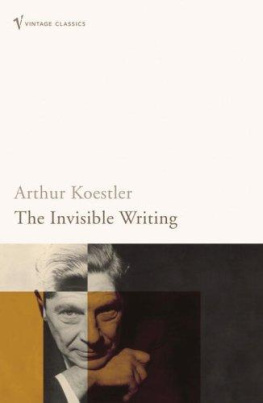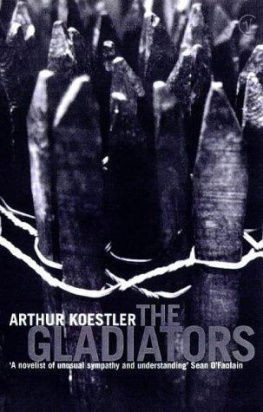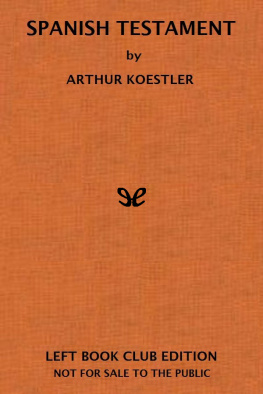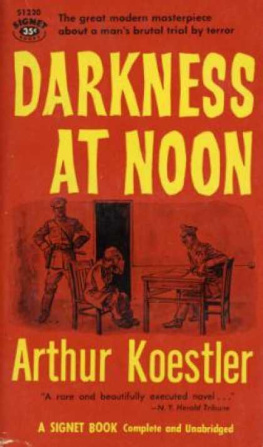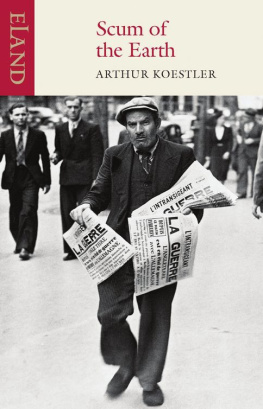Arthur Koestler - The Invisible Writing
Here you can read online Arthur Koestler - The Invisible Writing full text of the book (entire story) in english for free. Download pdf and epub, get meaning, cover and reviews about this ebook. year: 1954, publisher: Macmillan, genre: Science. Description of the work, (preface) as well as reviews are available. Best literature library LitArk.com created for fans of good reading and offers a wide selection of genres:
Romance novel
Science fiction
Adventure
Detective
Science
History
Home and family
Prose
Art
Politics
Computer
Non-fiction
Religion
Business
Children
Humor
Choose a favorite category and find really read worthwhile books. Enjoy immersion in the world of imagination, feel the emotions of the characters or learn something new for yourself, make an fascinating discovery.
- Book:The Invisible Writing
- Author:
- Publisher:Macmillan
- Genre:
- Year:1954
- Rating:5 / 5
- Favourites:Add to favourites
- Your mark:
- 100
- 1
- 2
- 3
- 4
- 5
The Invisible Writing: summary, description and annotation
We offer to read an annotation, description, summary or preface (depends on what the author of the book "The Invisible Writing" wrote himself). If you haven't found the necessary information about the book — write in the comments, we will try to find it.
The Invisible Writing — read online for free the complete book (whole text) full work
Below is the text of the book, divided by pages. System saving the place of the last page read, allows you to conveniently read the book "The Invisible Writing" online for free, without having to search again every time where you left off. Put a bookmark, and you can go to the page where you finished reading at any time.
Font size:
Interval:
Bookmark:
THE INVISIBLE WRITING
Being the second volume of
ARROW IN THE BLUE
AN AUTOBIOGRAPHY
BY
ARTHUR KOESTLER
NEW YORK
THE MACMILLAN COMPANY
I954
To Dorothy
Une vie danalyse pour une heure de synthese!
FUSTEL DE COULANGES
Everything becomes legend, if the gentlemen will have the goodness to wait.
NORMAN DOUGLAS
Contents
1932
1932-33
1933-36
1936-40
AUTHORS NOTE
The previous volume of this autobiography covered my first twenty-six years, up to my joining the Communist Party in 1931. The present, concluding volume ends with my escape to England in 1940, and my settling down in that country. An epilogue brings the narrative up to the present date.
To write ones memoirs before one has reached the age of fifty may seem a premature and somewhat presumptuous undertaking. But if ones past is worth recording at all, this should be done before its colour and fragrance have faded. Gains in distance and perspective must be balanced against losses in emotional freshness, for facts are more easily retained than feelings. Facts can be complemented by files and newspaper records, emotions not.
This point will become painfully apparent to the reader through the first five or six chapters of this book, which deal with my early Communist days in Berlin and Russia. I found it impossible to revive the naive enthusiasm of that period: I could analyse the ashes, but not resurrect the flame. I disliked writing these chapters, but felt the chroniclers compulsion to record material which appears to him trivial and boring, in the hope that at some future date it will appear less so. The reader is advised to get through these opening chapters as best and as quickly as he can.
Lonon December 31, 1953
Part One
EUPHORIA
1932
When one burns ones boats, what a very nice fire it makes
DYLAN THOMAS
I. Bridge-Burning
I went to Communism as one goes to a spring of fresh water.
PABLO PICASSO
I WENT to Communism as one goes to a spring of fresh water, and I left Communism as one clambers out of a poisoned river strewn with the wreckage of flooded cities and the corpses of the drowned. This, in sum, is my story from 1931 to 1938, from my twenty-sixth to my thirty-third year. The reeds to which I clung and which saved me from being swallowed up were the outgrowth of a new faith, rooted in mud, slippery, elusive, yet tenacious. The quality of that faith I cannot define beyond saying that in my youth I regarded the universe as an open book, printed in the language of physical equations and social determinants, whereas now it appears to me as a text written in invisible ink, of which, in our rare moments of grace, we were able to decipher a small fragment. This volume, then, is the account of a journey from specious clarity to obscure groping.
I joined the Communist Party on December 3rd, 1941. Seven months later I emigrated from Germany to Soviet Russia. These seven months of transition are divided into two periods. During the first, I was a secret member of the Party; during the second, an open one.
In The God That Failed I have told in some detail the story of my enlistment, and how I was drawn into the Partys Intelligence network. I shall therefore confine myself to a brief outline of these events.
My written application for membership of the K.P.D.Kommunistische Partei Deutschlandswas addressed to the Central Committee of the Party. It was answered a week or more later by a rather mystifying letter, typed on blank paper and bearing an illegible signature, in which I was invited, with reference to your esteemed of December 31I st to meet `a representative of our firm at the offices of a certain paper-mill in Berlin.
The man whom I met at the appointed place and hour was Herr Ernst Schneller, head of the Department for Agitation and Propaganda (AGITPROP) of the German Communist Party, and at the same time chief of one of the Cominterns secret apparats or intelligence networks. In yet another capacity, Schneller was Reichstagsabgeordneter, a member of the German Parliament. This double existence as an official dignitary and as an underground conspirator was by no means exceptional. A large proportion of the Communist membership lived, and still lives, to use French Party slang, a cheval -a term borrowed from roulette and referring to a player who backs two numbers simultaneously. Nor is such an existence considered dishonourable. To exploit fully the constitutional liberties provided by bourgeois society for the purpose of destroying them is elementary Marxist dialectics.
I had two meetings with Ernst Schneller, and after these I never saw him again. A few years later he died in a Nazi prison where he was serving a six-year sentence of hard labour. He was an insignificant-looking, shy, thin, bony man with a pinched face and an awkward smile. He told me that he was a vegetarian and lived mostly on raw vegetables and fruit; also, that he never read any newspapers except the Party press. At first I took him for a narrowminded bureaucrat, but my initial feeling of condescension soon changed into respect for his quiet and astute manner of arguing. I told him of my desire to throw up my job and go as a tractor-driver to Russia; but within a few hours Schncller had convinced me that I would be more useful to the Party by keeping my convictions secret, carrying on as a journalist, influencing, within the limits of my possibilities, the policy of my paper, and passing on to the Party any inside information that came my way. The Party, he explained, though still enjoying the privilege of legality, would probably quite soon be outlawed and forced underground. In that event people like myself, who were in respectable positions and untainted by suspicion, would be even more valuable than at present in the struggle against Fascism and imperialist aggression. Everything he said sounded so plausible that by the end of our first meeting I agreed to his proposal and became, without being fully aware of the fact, a member of the Cominterns intelligence service.
At our second and last meeting, Schneller handed me my Party card, made out under the alias `Ivan Steinberg. He had also brought along a dark, blowsy girl named Paula who would serve as a liaison with my future superior in the apparat, named Edgar. Thus from the moment of joining the Party I found myself plunged into a strange world of conspiratorial twilight, populated by Edgars and Paulas without a surname or address-fleeting, elusive shapes like the phosphorescent creatures of the deep sea.
Edgar and Paula were my only contacts in the apparat. We usually met in my fiat, where Paula took down on a typewriter what information I was able to supply, while Edgar would pace up and down the room and put in a question now and then to clarify a point. He was a slim, smooth, smiling young man of thirty, blond, with an open face and frank eyes. His real name I only discovered more than twenty years later, in the following footnote to AlexanderWeissbergs book, Conspiracy of Silence (London I952):
`In The God that Failed Koestler mentions a man named Edgar Edgar was a revolutionary worker from Hamburg. His real name was Fritz Burde. He was a decent fellow and a good comrade. I met him in I936 in Moscow when he had a high position in the Red Army Intelligence service. For a long time the G.P.U. and the War Commissariat had been fighting for control of this important secret organisation abroad. Once Tukhachevsky was arrested, the G.P.U. had a free hand. They recalled almost all the military secret agents from abroad and arrested them. Fritz Burde was in charge of the secret service of the Red Army in Scandinavia, and when he was recalled with the others he told friends that he was going to his death, but that he had no alternative.
Font size:
Interval:
Bookmark:
Similar books «The Invisible Writing»
Look at similar books to The Invisible Writing. We have selected literature similar in name and meaning in the hope of providing readers with more options to find new, interesting, not yet read works.
Discussion, reviews of the book The Invisible Writing and just readers' own opinions. Leave your comments, write what you think about the work, its meaning or the main characters. Specify what exactly you liked and what you didn't like, and why you think so.

